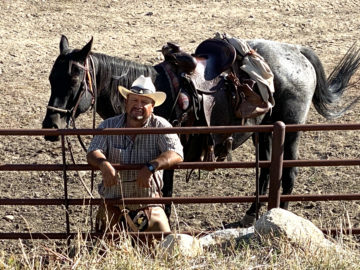by Mark Harvey

A week before he died, I drove my good friend and ranch foreman, Rey Rodriguez, to Denver to catch a bus to Chihuahua, Mexico. He was taking a two-week vacation to visit his family there. On the three-hour drive to Denver, we practiced answering questions for the test given to immigrants applying for US citizenship. He had downloaded 100 potential questions onto his phone and had been studying for more than a year to take the test. I often wondered why he didn’t take the test sooner because he had the questions down. Most of the test is composed of the sort of useless memorization you’d find in an American high school in 1950.
Who was Benjamin Franklin? What do the fifty stars on the American flag represent? Where is the Statue of Liberty? Who wrote the Declaration of Independence?
I have no idea how this test ensures that an immigrant will make a good citizen other than ensuring that the applicant knows far more about American history than the complacent homeowner in Pasadena, California, going all red-faced about keeping “illegals” out of ‘America—between bites of avocado that the “illegals” planted, picked, and packed.
We probably went through 60 questions and Rey didn’t miss one. My suspicion is that Rey had very mixed feelings about becoming an official gringo. Like many Mexicans, he had done the Mexico-America dance for years. Traveling great distances from Chihuahua to places like Yuma, Colorado, to work on a giant feedlot, the Central Valley of California to harvest vegetables, or western Colorado to work on our ranch.
He liked America okay and admired certain things about gringos. But his heart and soul were in Mexico. America was a way to stay afloat financially. I asked him what the average wage of a ranch worker in Mexico was and I reckon American ranch workers make in the neighborhood of 10 times as much. Read more »

 It’s not about dying, really—it’s about knowing you’re about to die. Not in the abstract way that we haphazardly confront our own mortality as we reach middle age and contemplate getting old. And not even in the way (I imagine) that someone with a terminal diagnosis might think about death—sooner than expected and no longer theoretical. It’s much more immediate than that.
It’s not about dying, really—it’s about knowing you’re about to die. Not in the abstract way that we haphazardly confront our own mortality as we reach middle age and contemplate getting old. And not even in the way (I imagine) that someone with a terminal diagnosis might think about death—sooner than expected and no longer theoretical. It’s much more immediate than that.